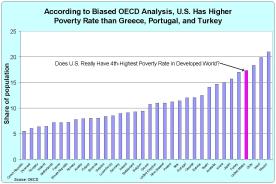I religiously read just about everything from Thomas Sowell, John Stossel, Walter Williams, Tim Carney, and other libertarian-minded experts
But I also make a point to regularly read non-libertarians such as Desmond Lachman, Will Wilkinson, Dalibor Rohac, and Noah Smith even though I sometimes – or even often – disagree with their policy prescriptions.
What matters is that they generally have intelligent and thoughtful observations on issues that I care about.
But they’re not necessarily accurate. For instance, Noah Smith recently wrote an interesting column for Bloomberg about whether people are poor because of their own behavior or because of external factors.
Here are the passages that caught my attention.
…there is at least one rich country where people…work hard, avoid risky, self-destructive behavior and make wise life choices. That country is Japan. And it still has plenty of poverty.
…Given all of this good behavior, conservatives might expect that Japan’s poverty rate would be very low. But the opposite is true; Japan has a relatively high number of poor people for an advanced country. Defined by the percentage of the population earning less than half of the median national income, Japan’s poverty rate is more than 15% — a little lower than the U.S., but considerably higher than countries such as Germany, Canada or Australia… This suggests that there is something very wrong with the conservative theory of poverty.
Fortunately, I don’t need to explain what’s wrong with Smith’s analysis.
Writing for National Review, Kevin Williamson has already pointed out his errors.
Smith here relies on a useless measure of “relative” poverty, the share of the population earning less than half of the median income. You can see the limitations of that approach:
A uniformly poor society in which 99 percent of the people live on 50 cents a day and 1 percent live on 49 cents a day would have a poverty rate of 0.00; a rich society with incomes that are rising across-the-board but are rising much more quickly for the top two-thirds would have a rising poverty rate… It would be far better to consider poverty in absolute terms, but our progressive friends are strangely resistant to that.
It is indeed strange that so many folks on the left have decided to use an artificial and misleading definition of poverty. One that depends on the distribution of income rather than any specific measure of poverty.
Which is insanely dishonest. It means that everyone’s income could double and the supposed rate of poverty would stay the same.
Or a country could execute all the rich people  and the alleged rate of poverty would decline.
and the alleged rate of poverty would decline.
No wonder the practitioners of this approach often produce absurd data, such as the OECD’s assertion that there’s more poverty in the United States than in basket case economies such as Greece and Italy.
Shame on Noah Smith. He should know better.
I’ll continue to read his work, so he’s not being kicked out of my club of non-libertarian writers.
But I will add him to list of people and groups who are guilty of peddling fake poverty data. These “poverty hucksters” include the OECD, of course, and also the United Nations, the New York Times, the Equal Welfare Association, Germany’s Institute of Labor Economics, the Obama Administration, and the European Commission.
P.S. A “poverty pimp,” by contrast, is someone who personally profits from administering the welfare state.
[…] As I wrote a few years ago, it would be “insanely dishonest.” That’s because “everyone’s income could double and the supposed rate of poverty would stay the same.” Or that “a country could execute all the rich people and the alleged rate of poverty would decline.” […]
[…] I wrote a few years ago, it would be “insanely dishonest.” That’s because […]
[…] who push an utterly dishonest definition of poverty, which I first wrote about back in 2010. But this article from 2019 has the best […]
[…] Professor Noah Smith […]
[…] Noah Smith leans to the left. But that doesn’t stop him, in a column for Bloomberg, from looking at what happened in […]
[…] Professor Noah Smith […]
Steven Taylor, that is done. Meyer and Sullivan track what it costs to consume at a level not to be in poverty, that is, to create a consumption poverty rate (CPR) that is shown on the last track. (Their paper including data is at this link https://leo.nd.edu/assets/249750/meyer_sullivan_cpr_2016_1_.pdf) To listen to the news media and the advocacy groups everything is a crisis and a disaster and the world and the US is getting worse. The nice thing about data is it proves the obverse, the world and the US is getting better at a rate begun in about 1980 that is astonishing. But good news does not bleed and therefore will not lead. One of the reasons for the CPR is consumption is a better predictor of deprivation than income. (Perhaps two people have the same income, but one cannot afford to put good food on the table, who is worse off?). So here is what is remarkable: From 1980 to 2015 the consumption poverty rate fell by 9.4 percentage points, while the official poverty rate rose by 0.5 percentage points.
I like the terms “poverty hucksters” and “poverty pimps.” The problem with statistics is that they can be used to support just about any position. Someone should do a study of “poverty” based on consumption, not income. If I’m below the median income point, yet receive large infusion of cash from government programs which aren’t included in my official income, then my consumption would be a better indicator of my economic well-being.